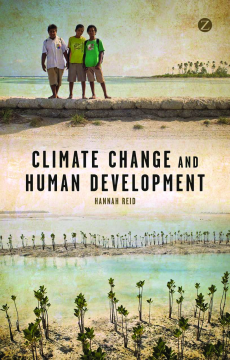
Additional Information
Book Details
Abstract
Whilst the world's poor are clearly hit hardest by climate change impacts, so too do they hold many of the solutions for how best to cope with its impacts, and at times reduce greenhouse gas emissions to zero.
In this wide-ranging book, Hannah Reid offers a rich compendium of real life scenarios and brings home the realities of how poor people are suffering from and coping with climate change impacts today.
Drawing on case studies gathered by the UP in Smoke group - a powerful coalition of global environment and development organizations including Greenpeace, Oxfam, Practical Action and the WWF - this book provides new models for human development in a climate-change-constrained future as well as positive solutions to tackling climate change at the macro-level with proposals from luminaries such as Professors Wangari Maathai, Manfred Max-Neef and Jayati Ghosh.
'The Up in Smoke coalition was a remarkable coming-together of environment and development agencies; this book presents their findings, a powerful picture of a world in which climate change is becoming an ever more dangerous reality - and the people least responsible are suffering most from the consequences. But it also provides inspiring stories that show that human ingenuity and endeavour can still point ways to a better future for all this Earth's inhabitants.'
Winnie Byanyima, Executive Director of Oxfam International
'I am delighted that such a broad group of environment and development organizations, many of which are faith based, have come together to speak with a common voice, drawing attention to climate change in the African context. This report shows the strength and creativity of African people in times of stress. What is needed most now is that Africans are supported in their efforts to build on these strengths.'
Archbishop Desmond Tutu
'Hannah Reid provides an illuminating human development perspective on a system in crisis. Documenting the efforts of the world's poor and most vulnerable to cope with and respond to the impact of global warming the book is a very readable account of a possible solution to a problem that is reaching global crisis proportions. A must read.'
Henry Veltmeyer, professor of development studies, Saint Mary's University
'This is an important book for several reasons. It shows that across all sectors and all countries, the livelihoods of the poorest are - today - being undermined by climate change. Yet at the same time the capacity not only to cope, but to build improved lives, resides within these communities, sometimes catalysed by the work of NGOs such as those in the Up In Smoke coalition. The central conclusion, that both development and adaptation must focus on strengthening communities from the bottom up and build opportunities for participation in policy making, is an urgent message.'
Jonathan Ensor, senior researcher, Stockholm Environment Institute
'This grounded analysis of climate change's impact around the world, rich in perspectives from both rural and urban contexts, shows why we must urgently squeeze carbon out of global energy and economic systems. The book brings together the collective wisdom of the Up in smoke coalition, and argues for rapid cuts in greenhouse gas emissions, and the alternative framing of growth and development. Must read Reid!'
Camilla Toulmin, Director, International Institute for Environment and Development
'Whilst there is a clear moral and ethical dilemma that the world's poorest, and least responsible for carbon production, are bearing and will continue to bear the brunt of climate change impacts, this positive and timely book uses case studies that remind us there are new models of human development coming from those most impacted, that can guide us in both our adaptation and our mitigation efforts'
Professor Julian Agyeman, Tufts University
Dr Hannah Reid is a researcher, currently working with the Climate Change Group and the Biodiversity Team at the International Institute for Environment and Development in London. She has a PhD in Biodiversity Management and over twelve years' experience working on climate change, with particular focus on how best to help those who are most vulnerable to its impacts. She was one of the founding members of the Up in Smoke group in 2003.
Table of Contents
| Section Title | Page | Action | Price |
|---|---|---|---|
| Front cover | Front cover | ||
| About the author | ii | ||
| Title | iii | ||
| Copyright | iv | ||
| Contents | v | ||
| Acknowledgements | vii | ||
| Preface | viii | ||
| Up in Smoke coalition members | ix | ||
| Introduction | 1 | ||
| Energy and economic growth | 5 | ||
| Progress on the MDGs | 9 | ||
| 1 Climate change: what to expect | 13 | ||
| 2 Food and farming | 18 | ||
| How farmers are coping | 33 | ||
| 3 Water | 55 | ||
| Coastal areas and sea-level rise | 66 | ||
| Glacial melt | 74 | ||
| 4 Health | 81 | ||
| 5 Energy | 88 | ||
| Biofuels | 115 | ||
| 6 Disasters | 121 | ||
| Floods | 123 | ||
| Droughts | 130 | ||
| Hurricanes, cyclones and storms | 138 | ||
| Recovering from disasters | 144 | ||
| Reducing disaster risks | 149 | ||
| 7 The natural environment | 164 | ||
| Forests | 175 | ||
| 8 Cities | 187 | ||
| 9 Women | 195 | ||
| 10 Trade | 206 | ||
| 11 Migration | 210 | ||
| 12 Conflict | 217 | ||
| 13 What next? | 223 | ||
| New models for human progress | 232 | ||
| Notes | 251 | ||
| Bibliography | 267 | ||
| Index | 277 |
